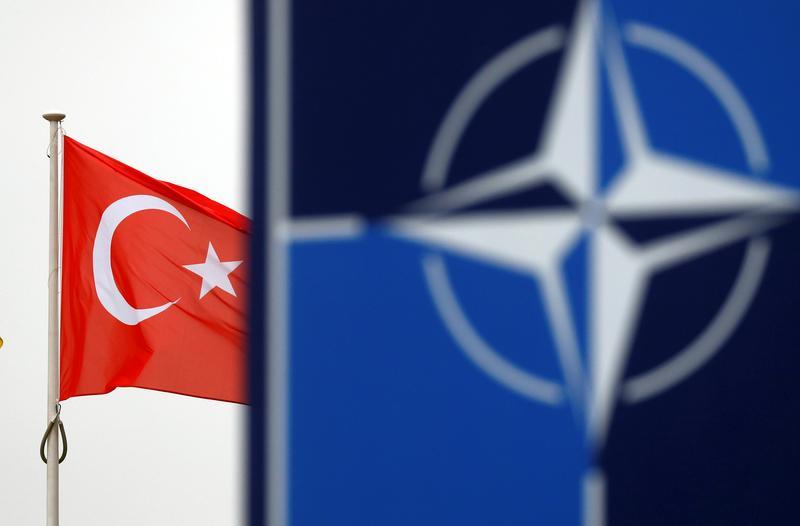BY ZEYNEP GURCANLI
The Ukraine war revealed the anti-Western sentiment in the Turkish public. Whether conservative or modern, from the political Islamist to the secular, the majority of Turkish society has tolerated Russia’s attempt to invade Ukraine simply because of its anti-Western attitude, so much so that the fact that Turkey is a full member of NATO and a signatory of all the good or bad decisions taken by the alliance so far has been ignored.
President Erdogan also decided to politically mobilize this emerging sentiment in Turkey before the elections to be held in a year.
ANKARA’S PREVIOUS NEGOTIATIONS WITH NATO
This is not the first time for AK Party governments.
Erdogan had previously entered into a public bargaining process with Turkey’s allies, both in NATO’s operation against Libya and in the appointment of former Danish Prime Minister Anders Fogh Rasmussen as NATO Secretary- General.
However, these negotiations conducted in front of the whole world did not develop in line with Ankara’s will. Turkey quietly joined NATO’s mission in Libya and even assumed the command of this mission just 15 days after Erdogan asked what NATO was doing in Libya. In the bargain on Rasmussen’s appointment as the Secretary-General, Turkey could not gain anything other than the unkept promises regarding the fight against terrorism with the NATO Deputy Secretary-General, who is not responsible for political affairs.
WHO IS THE MAIN BARGAIN WITH?
On the surface, the AK Party government gives weight to a discourse that questions the tolerant attitudes of Sweden and Finland towards the PKK and FETO terrorist organizations in the negotiation of these two countries’ NATO membership.
However, there is a perception that the real bargain is to be made with the Biden administration in the U.S. Ankara’s expectations of Washington spread over a wide spectrum, from the personal to homeland security.
There are many demands on the table, from the comfortable residence of the FETO ringleader in the U.S. to the support given by the Biden administration to the PYD -YPG, the Syrian extension of the PKK terrorist organization, from Turkey’s purchase of the F-16 or F-35 to the candid photos that Biden will pose for with Erdogan at the White House before the elections in Turkey.
Erdogan sent Foreign Minister Cavusoglu to the U.S. to meet with his American counterpart Blinken while saying “Do not bother” to the Swedish and Finnish delegations who wanted to come to Ankara to discuss NATO membership.
MISTAKE AFTER MISTAKE
However, unfortunately, one mistake was clearly made after another in the bargaining process. The first mistake was taking the wholesale approach. Sweden and Finland’s relations with Turkey are not the same. Finland is one of the biggest supporters of Turkey’s EU membership process. Moreover, it is not possible to lump Sweden together with Finland concerning tolerating terrorist organizations.
This is why Erdogan himself said in a phone call with his Finnish counterpart that Ankara is looking forward to Finland’s NATO membership even before the NATO membership process of these countries became official.
If Ankara wants to negotiate with Sweden over support for terrorism, it would only make it more difficult to include Finland in those discussions. The second mistake is that the bargaining has been made public. Diplomacy is more effective when conducted behind closed doors. Confidentiality prevents the public reflection of the compromises made by the negotiating parties at the table.
Thus, common ground is found more easily, often allowing both sides to win.
However, when the bargain is made loudly, the attitudes of the parties harden and the difference between the winner and loser turns into a source of embarrassment. The losses taken by the AK Party governments at the bargaining table, both in the Libya and Secretary- General issues, are still being written about in the world press.
The third mistake lies in the perception that has emerged. While Turkey opposes the NATO membership of Sweden and Finland, the statements of Russia, which is the main threat, made the situation of the AK Party government even more difficult. Russian Leader Putin said that the NATO memberships of Finland and Sweden would not make a big difference and that Moscow would not react harshly to this enlargement. It appeared that Turkey was the only obstacle to the enlargement, which even Moscow said could be possible. Worse, a perception emerged that Russia, which does not want Sweden and Finland’s NATO membership, is trying to reach its goal through Turkey – so to speak – without getting its own hands dirty.
Countries trying to pressure Turkey have already begun exploiting this perception.
Erdogan’s “Do not bother” statement caused eyebrows to rise in the American Congress. At the same time, Greek Prime Minister Mitsotakis’ message to the U.S. deputies that they should not allow the sale of F-16s to Turkey during his U.S. trip, which also included a White House reception and a speech at Congress, was eagerly received.
The picture that emerged is a new kind of isolation at a time when the AK Party was trying to get rid of its precious isolation. In this bargain, which was initiated at the expense of isolation, the possible gains in the fight against terrorism have already been reduced to the minimum possible from the very beginning due to megaphone diplomacy.
But will a photo of the world leader embracing the U.S. president be enough to win elections in this economic crisis?
That is the real question.









